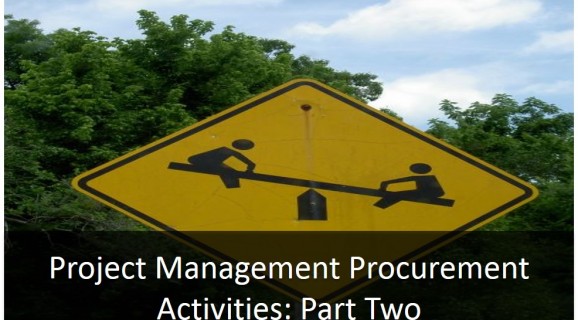
Once the initiation and planning phases are complete, the project manager will need to progress the project. This includes the utilisation of effective procurement processes and procedures. While the procurement approach will have been established during the initiation phase, the project manager must execute procurement effectively in order for the project to meet expected deliverables.
Having discussed the initiation and planning phases in terms of procurement requirements, in this second part of two dedicated to procurement in project management, we’ll look at procurement during execution and closing.
Procurement during project execution
As a project progresses, the project manager will focus on the coordination of and maintenance of relationships with suppliers and contractors.
First, contracts that have been negotiated will need to be awarded. Contracts may be placed using a variety of contract types, including a fixed-price basis or costs-reimbursable basis. Fixed fees, incentive payments, and penalties may all be associated clauses and conditions. The payment of contracts may be staged, and punctuated with milestone payments throughout the project/ task lifecycle. Contracts will define all parameters pertinent to delivery.
The project manager will have the ultimate responsibility for managing, administering, and monitoring contracts, though control may have been delegated. Monitoring be achieved by regular reporting of issues, assessment of ongoing risks, and checking of suppliers and suppliers against pre-identified deliverables.
Contract type will determine the level of skills and effort required to manage procurement contracts. Things that have a long lead time to bring in should be addressed early. Contractor and supplier performance should be tracked against delivery criteria set during the contract negotiation stage. According to this performance, the project manager will need to manage contract variations – it may be that the contract will have to be terminated, or there may be room to renegotiate terms and conditions as improvement of performance is a more desirable outcome.
Procurement closing
Close procurement is also called close contract. A project may have a single procurement contract, or multiple procurement contracts (each needing to be closed as the project progresses). During the close procurement phase, he project manager will ensure that:
- All outputs have been completed satisfactorily
- Feedback to the supplier is given on contract performance
- All final payments are made
- Lessons are learned to enhance procurement quality on future projects
- Bets practices have been identified and documented for repetition in the future
In our next article, we’ll examine more closely the types of contracts that may be used during the procurement process.

